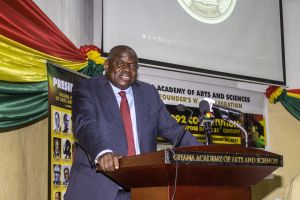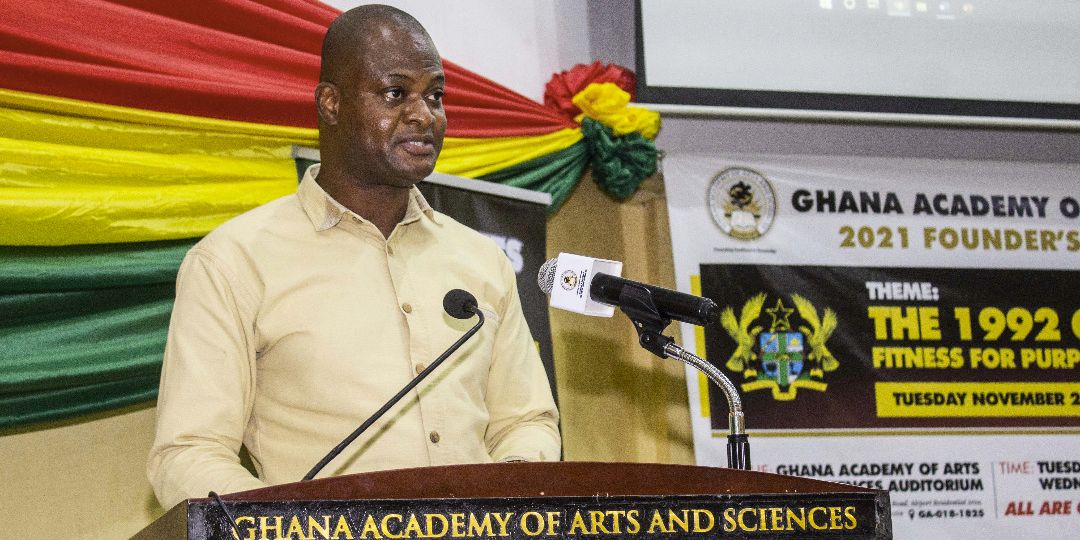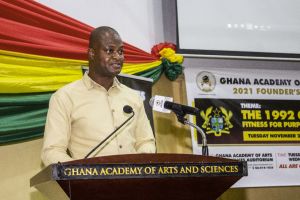Prof. Raymond Akongburo Atuguba, Dean of the University of Ghana School of Law says “all the constitutional and governance issues we discuss in this country on a day-to-day basis, pretending they are new and fresh, have been identified, researched, discussed, widely consulted upon, and recommended upon by the Constitution Review Commission (CRC) and others” and that “since we know the constitutional challenges and have the solutions, we ought to stop talking and whining, and do what we know we must do; that is amend the constitution, so that our democracy may proceed on a firmer and more productive footing”.
He made these statements on Wednesday 25 November 2021, when he mounted the rostrum of the Ghana Academy of Arts and Sciences, as the first presenter on the subtopic, “The 1992 Constitution: Achievements and Challenges to Constitutional Governance”, on the first day of a 2-day symposium organized by the Ghana Academy of Arts and Sciences (GAAS), as part of its 2021 Founders Week Programme. The theme for the 4-day Lectures is: The 1992 Constitution: Fitness for Purpose in the 21st Century?
He said, the 1992 Constitution, by preserving Customary Law as a source of law and protecting and advancing the institution of chieftaincy, has prepared the way for increasingly making our laws reflective of the lived reality of the ordinary Ghanaian.
He added that, resultantly, thanks to the 1992 Constitution, Ghana, “has reaped the benefits of a very well put together constitution: largely free and fair elections; peaceful transfers of governmental powers; an executive that is largely placed in check by the legislature and the judiciary; a Parliament that is getting less and less rubber-stamp as the years go by, and is increasingly calling the President, Ministers of State, and the Security Forces to order; and a really competent judiciary whose sterling services are sought after the world over, and with a particular reputation for managing presidential election petitions in a manner that keeps our nation together and safe”.
However, the former Executive Secretary of the Professor Albert K Fiadjoe-led Constitution Review Commission under the Mills administration says the nation’s “refusal to implement the constitutional injunctions on decentralization means that we must rewrite those provisions, making them so clear that the above acts of mischief may be swiftly truncated”.
He said “there are many other textual and operational aspects of our constitution that contain enough creases and wrinkles to warrant review and that our moneyed system of electioneering and elections; the winner-takes-all system of governance based on ultra-ethnicity and clannism; the suffocation of Parliament by Executive dominance; judicial corruption, defined broadly to include all the ways in which judicial decisions are taken outside of fidelity to the law; general systemic corruption; the constriction of spaces for real participatory citizenship and civic engagement; and political, bureaucratic and administrative irresponsiveness and tyranny”.
He said the farther we are from the constitutional destination reflected in the provisions of Article 36 of the Constitution which had the intendment that the State would “take all necessary action to ensure that the national economy is managed in such a manner as to maximize the rate of economic development and to secure the maximum welfare, freedom and happiness of every person in Ghana and to provide adequate means of livelihood and suitable employment and public assistance to the needy;” the greater the evidence that, at least operationally, the 1992 Constitution has not delivered on the Ghana We Want.
He said while the 1992 Constitution has been enough for the nation’s needs and wants in the last three decades, it is no longer capable of satisfying our wants that are increasing and evolving and getting urgent by the hour.
He said, especially after the CRC countrywide consultations over ten years ago, every Ghanaian knows that when it comes to our wants, the 1992 Constitution is a kwashiorkor constitution. Increasingly, her “legs don’t work like they used to before” (Read the full presentation here).

Speaking on the sub-topic; Threats and Challenges to Constitutional Governance: Political Culture, Corruption and Missing Civil Societies, Prof Aryeetey said while Ghana’s burgeoning civil society in the second half of the 1970s waged a very successful campaign which paved the way for a change in government and the abandonment of the idea of ‘Union Government’, because they remained united throughout the campaign and fought a cause most Ghanaians believed in, civil society in Ghana in more recent times, has tended to be more fractured and susceptible to capture by the state.
He said even though civil society organizations have contributed in diverse ways to consolidating democracy, some of their efforts to press for the rule of law and social justice (either through the implementation of laws or the adoption of new legislative initiatives and reforms), have been perceived to promote other interests instead of those that seek to promote the true values and ‘spirit’ of the 1992 Constitution.
He said “a missing or weak civil society or an apparent lack of interest in pursuing the civic responsibilities that can foster development is itself a huge threat to the spirit of the 1992 Constitution” and that “when civil society becomes self-serving there, cease to be independent voices that can provide a balance in the situation where the different arms of government have coalesced around known political interests”.
Professor Aryeetey called for the shrinking space for independent voices in the political culture to be stopped and for those independent voices to fight for their space and make themselves increasingly relevant to society, bearing in mind the obvious reality that sitting on the fence cannot be good for the application of the spirit and letter of the constitution (Read the full presentation here).
The event which was streamed live on the Academy’s Facebook and Youtube pages was chaired by Emerita Prof Isabella Akyinbah Quakyi, a fellow and Vice President of the Sciences Section of the Academy.



